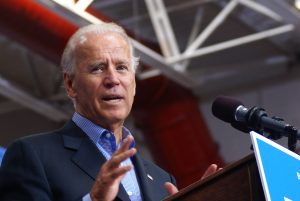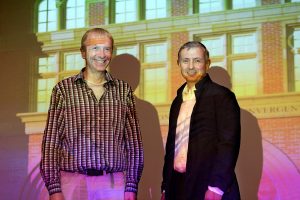Biden announces cancer research project with USC
USC will participate in Vice President Joe Biden’s Cancer Moonshot project in an effort to create a new database to advance cancer research, according to a press release sent out last week.
The research will be conducted by the Kuhn Laboratory at USC, part of the USC Michelson Center for Convergent Bioscience. The goal of the initiative is to accelerate the development and approval of simple, accurate and reliable blood tests for biologically based precision treatment and disease monitoring.
Peter Kuhn, associate director of the Kuhn Laboratory, said what makes the Cancer Moonshot initiative significant is that it puts the patient at the center.

Photo from Marc Nozell, Flickr
Combating cancer · Vice President Joe Biden, pictured here at a campaign event in 2012, announced Monday that his Cancer Moonshot initiative would partner with USC to develop a new blood profiling system.
“The original moonshot was really about putting man on the moon and returning man safely to earth, so it’s about that safe journey,” Kuhn said.
USC will be in charge of contributing data from the High-Definition Single-Cell Assay, an analysis framework that characterizes cancer from a simple blood draw.
“People’s cancer can be manifested in their blood, DNA fragments shed from the cancer or cells that are shed from the cancer,” said James Hicks, a professor of research at the Bridge Institute. “By sequencing DNA or analyze the protein expressions and the shape and size of the cells and blood, we’ve already shown that we can tell when cancer is actually changing in a time course.”
The data will be compiled to make the Blood Profiling Atlas Pilot, a database designed to help accelerate cancer therapeutic research and development. The Blood Profiling Atlas aims to improve a doctor’s ability to track cancer progression and disease treatment decisions.
“The Blood Profiling Atlas, which is the most recent announcement from Monday, is where we actually step back and say ‘we have one way of characterizing blood, but there is another half dozen or so ways of characterizing blood,’” Kuhn said. “‘What if we all get together and build a large database where eventually we will take blood samples from the patients and characterize them in a bunch of different ways and put the data back together?’”
Kuhn and the USC Michelson Center for Convergent Bioscience have used the Convergence Science Initiative in Cancer to emphasize the need for research and development of what Kuhn calls the continuum of cancer care.
“That, of course, requires us to understand both cancer as a disease and how it evolves in each individual patient over time, as well as the patient’s health, but also the patient as a person of course,” Kuhn said.
The Bridge Institute has taken the responsibility to find ways to obtain that data.

Photo from USC News
New frontiers · Peter Kuhn was named dean’s professor of biological sciences in 2014. Now, he is the associate director of the Bridge Institute.
“We have 20 people looking at how the behavior of the DNA and the cells in the blood of cancer patients, breast cancer, prostate cancer, lung cancer, colorectal cancer and ovarian cancer, and the idea is to be able to identify early warning of any changes in the cancer that are occurring that might lead to resistance of therapy or that might lead to the need to change therapies,” Hicks said.
While last Monday’s announcement primarily dealt with the Blood Profiling Atlas, the Bridge institute has also made other developments that will be utilized by the Cancer Moonshot.
“We have also run this pilot program, clinical trial where we are quantifying the health performance data, and that actually was part of the final report to President Obama that was delivered on Monday,” Kuhn said. “Both of these programs have resonated well with Cancer Moonshot team and with the public, as well as those representing a real need in cancer research as it applies to how it evolves in the patient.”
USC will be undertaking the project with 19 other partners, combining its research with that of 13 different studies to make available raw data sets from circulating tumor cells, circulating tumor DNA and clinical data. The project has received support from all corners of the healthcare industry.
“In the meeting on Monday and Tuesday, there were representatives of all the major pharmaceutical companies and all the branches of government that have anything to do with healthcare: the VA, the Department of Defense, the National Cancer Institute and the FDA,” Hicks said. “This effort now has very broad support within the government and within the pharmaceutical industry.”

Praying that all these branches of government will participate in helping to prevent radioactive radon reduction with active preventative policies in place. Radioactive radon gas exposure-a leading cause of lung cancer- if taken as a separate category of cancer is number 7 on the list of causes of cancer death in our nation. No one seems to know about radon and our government is sweeping it under the carpet like a dirty secret. https://uploads.disquscdn.com/images/009e4662c15de637238c375e0c971d117eb157e674e21ca320a390aaf21a172a.jpg
Slide presented by Dr. Bill Field, 2016 International Radon Symposium, College of Public Health, University of Iowa
Gloria Linnertz
Citizens for Radioactive Radon Reduction